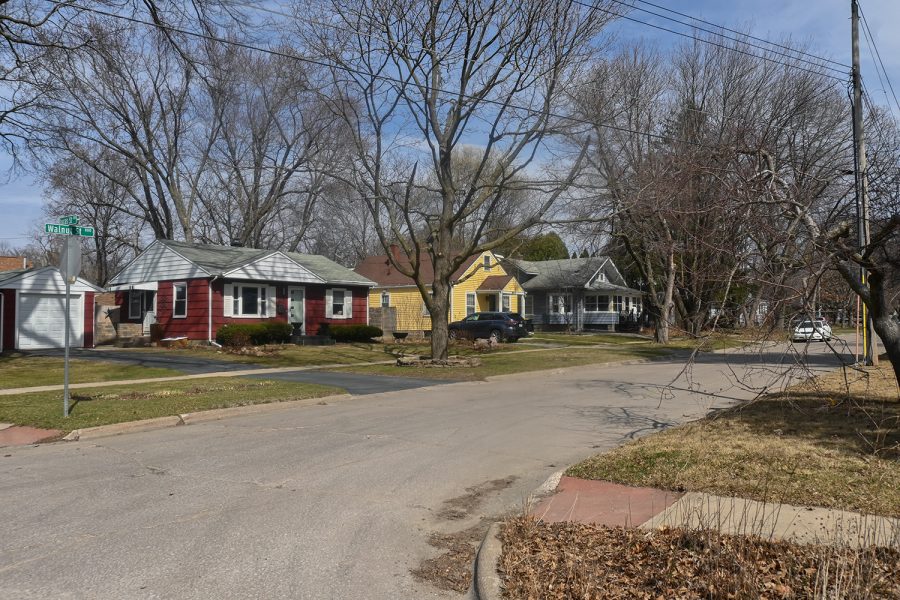Johnson County to use pandemic relief funds to decrease evictions
Johnson County is looking to increase housing stability in the community through the expansion of the county’s Eviction Diversion Program. The investment is funded through the county’s American Rescue Plan Act funding.
Houses are seen on Walnut St. in Iowa City on Monday, March 28, 2022.
March 31, 2022
Johnson County is aiming to decrease evictions in the county by expanding the county’s Eviction Diversion Program.
The program offers mediation services for landlord and tenant disputes prior to eviction, rent assistance, and tenant legal guidance and representation during eviction hearings.
The program is receiving a $337,500 investment over the next three fiscal years.
The increase in support for housing security was one of the projects the county chose to invest in through its American Rescue Plan Act funds.
The Johnson County Board of Supervisors approved the initial American Rescue Plan Act investments during a formal meeting last November.
The American Rescue Plan Act is a $1.9 trillion relief package intended to help U.S. communities financially harmed by the COVID-19 pandemic. Johnson County, with a population of roughly 150,000 residents, received $29.3 million.
The program was created after the Centers for Disease Control’s national eviction moratorium, which temporarily halted residential evictions, ended in August 2021 after being enacted in September 2020.
Lynette Jacoby, Johnson County social services director, said the moratorium being lifted resulted in a lot of renter households falling behind in rent, and that the number of eviction filings in Johnson County increased significantly.
“It was really essential that we create another opportunity for them to receive assistance,” she said.”[The program] is really a win-win because we’re helping folks remain stably housed while also ensuring that the landlord receives the rent that they have due to them.
Jacoby said the program offers more than just preventing evictions and the service benefits tenets and their families in the long run.
“If we can keep people stably housed, it often helps prevents job loss and helps allows kids to maintain and continue their education,” she said. “It also benefits renters if they don’t have an eviction on their record. Future rentability can be a challenge for households once they have that on their record.”
Johnson County collaborated on the program with the City of Iowa City, Iowa Legal Aid, Shelter House in Iowa City, and the Johnson County Affordable Housing Coalition.
Polk County was the first in Iowa to start an eviction prevention program with ARPA dollars in February 2021.
There are six similar eviction prevention programs in Iowa, Ericka Peterson, assistant litigation director at Iowa Legal Aid, said.
Peterson said by the end of 2020, the collective eviction prevention programs prevented 799 evictions across the state.
In 2021, 1,178 evictions were prevented, according to Iowa Legal Aid’s data, Peterson said.
Peterson said evictions were on the rise between 2016 and 2019 before the pandemic.
“They rose about 20 percent during that time period, but in Johnson County, they rose 47 percent,” Peterson said.
Based on 2022 filings by Iowa Legal Aid, Peterson said the programs are on track to exceed the number of filings in 2019.
Sara Barron, executive director at the Johnson County Affordable Housing Coalition, said the program also serves the community by informing them about housing resources.
“Housing is a human right, and if we have people be stably housed in our community, that benefits everyone,” she said. “We recognize the value of preventing eviction, and we’re looking to continue to move forward with offering that service.”
The Eviction Diversion Program has intervened in close to 50 eviction cases since it started, serving 92 people, and successfully prevented eviction in over 80 percent of the cases, according to Iowa Legal Aid.
In Johnson County, 63 percent of the intake calls the program has received for help with eviction have from people of color, the highest rate in the state per county, according to Iowa Legal Aid.
“There’s a disparity in who is most vulnerable to eviction in our community, and by focusing on preventing it, we are also working toward greater racial equity,” Barron said.
Peterson said the program will continue beyond the lifespan of the pandemic and thinks it’s a valuable resource for both tenants and landlords.
“We [started] this program very quickly with limited funding,” she said. “This investment guarantees that we will be able to continue doing this really important work into the future.”



